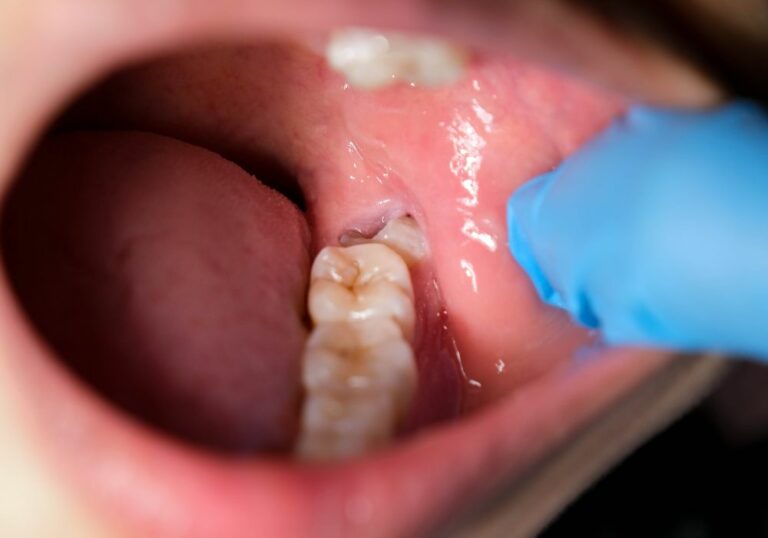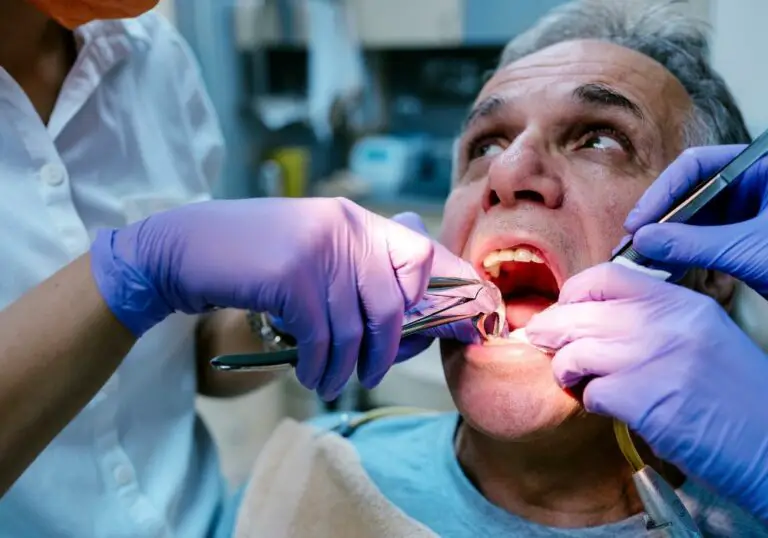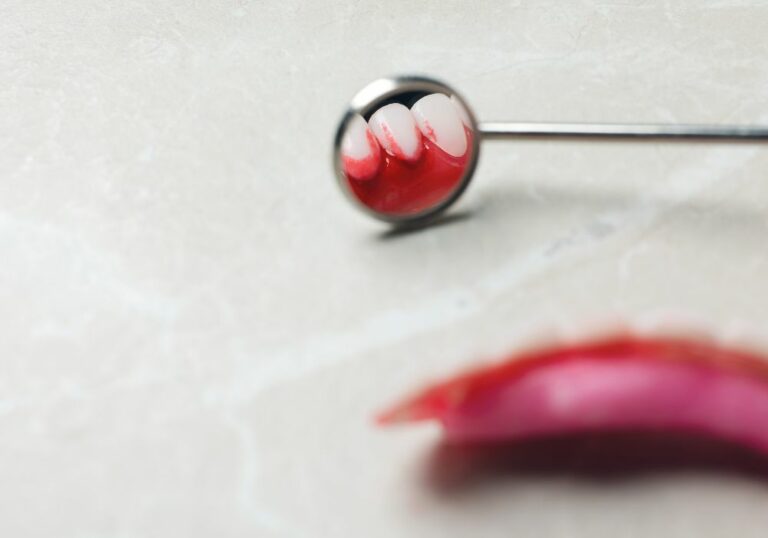Are you recovering from wisdom teeth removal surgery? If so, you may be wondering when you can stop cleaning the holes left behind after the extraction. It’s important to keep the extraction site clean to prevent infection and promote healing, but you may be unsure of how long you need to continue this routine. In this article, we’ll discuss when you can stop cleaning wisdom teeth holes and what signs to look for that indicate it’s time to stop.
After wisdom teeth removal, it’s normal to experience some bleeding and swelling in the extraction site. Your dentist or oral surgeon will provide you with instructions for caring for the site, which typically include rinsing your mouth with saltwater and avoiding certain foods. You’ll also need to clean the extraction site to prevent infection and promote healing. But how long do you need to continue this routine? The answer depends on several factors, including the extent of your surgery and how well you’re healing. In the next section, we’ll discuss when you can stop cleaning wisdom teeth holes and what signs to look for that indicate it’s time to stop.
Understanding Wisdom Teeth Holes
If you recently had your wisdom teeth removed, you may be wondering when you can stop cleaning the holes left behind by the extraction. It’s important to understand the purpose of these holes and why they need to be cleaned regularly.
When a wisdom tooth is extracted, it leaves behind a hole in the gum tissue and bone where the tooth once was. This hole is called a socket, and it’s an important part of the healing process. The socket allows new bone and gum tissue to grow and fill in the space left by the tooth.
In the days following your wisdom tooth extraction, it’s normal to experience some bleeding and swelling around the sockets. You may also notice some pain and discomfort in the area. To promote healing and prevent infection, it’s important to keep the sockets clean by gently rinsing your mouth with warm saltwater several times a day.
As the healing process progresses, the sockets will gradually fill in with new tissue, and the holes will become smaller and less deep. However, it’s important to continue cleaning the sockets until they have completely closed up. This can take several weeks or even months, depending on how quickly your body heals.
If you have any concerns about the healing process or the appearance of the sockets, don’t hesitate to contact your dentist or oral surgeon for advice. They can provide guidance on how to care for your sockets and ensure that they are healing properly.
Importance of Cleaning Wisdom Teeth Holes

After wisdom teeth removal, it is crucial to keep the extraction site clean to prevent infection and promote healing. The holes left by the extracted teeth can be a breeding ground for bacteria, which can lead to complications such as dry socket, infection, and delayed healing.
Cleaning the wisdom teeth holes is essential to remove food particles, debris, and bacteria that can accumulate in the area. Proper cleaning and care of the extraction site can help reduce pain, swelling, and the risk of infection.
Here are some tips to help you clean and care for your wisdom teeth holes:
- Rinse your mouth gently with warm salt water multiple times a day to reduce inflammation and promote healing. Mix a teaspoon of salt in a cup of warm water and swish the solution around your mouth for about 30 seconds before spitting it out.
- Use a soft-bristled toothbrush to gently clean the teeth and the extraction site. Avoid brushing the extraction site too hard, as it can cause bleeding and delay healing.
- Avoid using mouthwash or other alcohol-based products, as they can irritate the extraction site and delay healing.
- Eat soft, cool foods for the first few days after the extraction. Avoid hot, spicy, or crunchy foods that can irritate the extraction site and cause pain.
- Avoid smoking or using tobacco products, as they can delay healing and increase the risk of complications.
In summary, cleaning and caring for your wisdom teeth holes is essential to promote healing and prevent complications. Follow these tips to keep the extraction site clean and reduce the risk of infection and other complications.
The Healing Process of Wisdom Teeth Holes
If you have recently undergone wisdom tooth extraction, you may be wondering when you can stop cleaning the holes left behind. The healing process of wisdom teeth holes can take anywhere from a few days to a few weeks, depending on various factors such as age, overall health, and the complexity of the extraction.
Initial Days After Extraction
During the initial days after extraction, it is essential to keep the extraction site clean to prevent infection and promote healing. Your dentist or oral surgeon will provide you with specific instructions on how to care for the extraction site, but here are some general tips:
- Bite down on a gauze pad for 30-45 minutes after extraction to control bleeding.
- Apply an ice pack on your cheek for 10-20 minutes at a time to reduce swelling.
- Avoid hot, spicy, crunchy, and hard foods for the first few days.
- Rinse your mouth gently with warm salt water to keep the extraction site clean.
- Brush your teeth gently, avoiding the extraction site.
Weeks After Extraction
As the days go by, the extraction site will start to heal, and you may experience less pain and swelling. However, it is still crucial to keep the area clean to prevent infection and promote proper healing. Here are some tips for the weeks after extraction:
- Continue to rinse your mouth with warm salt water after meals and before bed.
- Brush your teeth gently, avoiding the extraction site.
- Avoid smoking, as it can delay healing and increase the risk of infection.
- Avoid using straws, as the suction can dislodge the blood clot and delay healing.
- Gradually reintroduce solid foods into your diet, starting with soft foods and gradually moving on to harder foods.
In general, the healing process of wisdom teeth holes takes about 7-10 days, but it can take longer for more complex extractions. Make sure to follow your dentist’s or oral surgeon’s instructions carefully and contact them if you experience any unusual symptoms such as severe pain, fever, or excessive bleeding.
Signs You Can Stop Cleaning Wisdom Teeth Holes

If you recently had your wisdom teeth removed, you know how important it is to keep the extraction site clean to prevent infections and promote healing. But how do you know when it’s safe to stop cleaning the holes left by your wisdom teeth? Here are some signs to look for:
Absence of Pain
One of the most common signs that it’s safe to stop cleaning your wisdom teeth holes is the absence of pain. After the first few days of recovery, you should start to feel less pain and discomfort in the extraction site. If you no longer feel any pain or sensitivity when you touch the area with your tongue or a toothbrush, it’s a good indication that the holes have healed and you can stop cleaning them.
No Swelling
Another sign that it’s safe to stop cleaning your wisdom teeth holes is the absence of swelling. Swelling is a normal part of the healing process, but it should start to go down after a few days. If you no longer see any swelling around the extraction site, it’s a good indication that the holes have healed and you can stop cleaning them.
No Food Trapping
Food trapping is a common problem after wisdom teeth extraction, and it can lead to infection and other complications if not addressed. If you notice that food is no longer getting stuck in the holes left by your wisdom teeth, it’s a good indication that the holes have healed and you can stop cleaning them.
In summary, if you no longer feel any pain or sensitivity, see any swelling, or notice any food trapping in the holes left by your wisdom teeth, it’s likely that they have healed and you can stop cleaning them. However, if you have any concerns or questions about your recovery, it’s always best to consult with your dentist or oral surgeon.
Consulting Your Dentist
It is always a good idea to consult with your dentist about the proper care of your wisdom teeth holes. Your dentist can give you personalized advice based on your specific situation. They can also check your healing progress and make sure there are no complications.
During your consultation, your dentist may provide you with the following information:
- How often you should clean your wisdom teeth holes
- What type of cleaning method is best for you
- How long you should continue cleaning your wisdom teeth holes
- Signs of complications to watch out for
Your dentist may also recommend follow-up appointments to monitor your healing progress and ensure that there are no issues.
If you are experiencing any pain or discomfort, it is important to bring this up during your consultation. Your dentist can provide you with pain relief options and determine if there are any underlying issues that need to be addressed.
Remember, every individual’s healing process is different, so it is important to follow your dentist’s advice and not compare your progress to others. With proper care and attention, your wisdom teeth holes should heal properly and without complications.
Maintaining Oral Hygiene After Wisdom Teeth Extraction

After your wisdom teeth extraction, it is important to maintain good oral hygiene to prevent infection and promote healing. Here are some tips to help you take care of your mouth:
Brushing
You can begin brushing your teeth the day after your surgery, but be gentle around the extraction site. Use a soft-bristled toothbrush and avoid brushing the area directly. Instead, brush around it to keep the area clean. You can also use an antimicrobial mouthwash to help kill bacteria and promote healing.
Rinsing
Rinsing your mouth with warm salt water can help soothe the extraction site and prevent infection. Mix a teaspoon of salt with a cup of warm water and swish it around your mouth for 30 seconds. Do this several times a day, especially after meals.
Eating
Stick to soft foods for the first few days after your surgery. Avoid crunchy or spicy foods that may irritate the extraction site. You can gradually introduce solid foods as the extraction site heals. Be sure to chew on the opposite side of your mouth to avoid putting pressure on the extraction site.
Pain Management
You may experience some pain and swelling after your surgery. Over-the-counter pain relievers such as ibuprofen or acetaminophen can help relieve pain. Follow the instructions on the label and do not exceed the recommended dosage.
Follow-Up Appointments
It is important to attend your follow-up appointments with your dentist or oral surgeon to ensure proper healing. They will check the extraction site and make sure everything is healing properly. If you have any concerns or questions, be sure to ask them during your appointment.
By following these tips, you can help promote healing and prevent infection after your wisdom teeth extraction. Remember to be gentle and patient with yourself as you recover.
Frequently Asked Questions
How long does it take for wisdom teeth holes to close?
The healing process of wisdom teeth holes can vary from person to person. On average, it can take around 1-2 weeks for the holes to close. However, in some cases, it can take up to a month or more. It is important to follow your dentist’s instructions to ensure proper healing.
When can I stop worrying about food getting stuck in wisdom teeth holes?
You should continue to be cautious about the food you eat for at least a week after the wisdom tooth extraction. As the holes heal, the risk of food getting stuck will decrease. However, you should still be careful for up to two weeks after the procedure.
Do you have to use the syringe after wisdom teeth?
Your dentist may recommend using a syringe to help clean the wisdom teeth holes. It is important to follow their instructions and use the syringe as directed. Typically, you will need to use the syringe for the first week after the procedure.
When can I stop rinsing with salt water after wisdom tooth extraction?
Rinsing with salt water can help promote healing and reduce the risk of infection. You should continue to rinse with salt water for at least a week after the procedure. However, if your dentist recommends continuing the rinse for a longer period, you should follow their instructions.
When can I use toothpaste after wisdom tooth extraction?
You should avoid using toothpaste for at least 24 hours after the procedure. After that, you can start brushing your teeth gently, being careful around the wisdom teeth holes. Your dentist may recommend a specific type of toothpaste to use during the healing process.
How do I clean upper holes after wisdom tooth extraction?
Cleaning the upper wisdom teeth holes can be challenging. You may need to use a syringe to help flush out any food particles or debris. Your dentist can provide specific instructions on how to properly clean the upper wisdom teeth holes.






